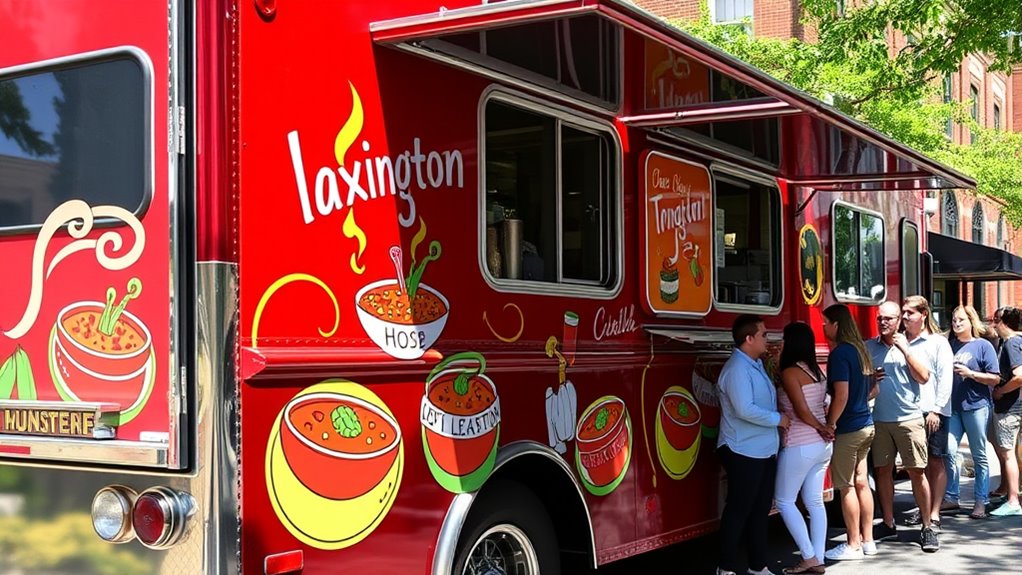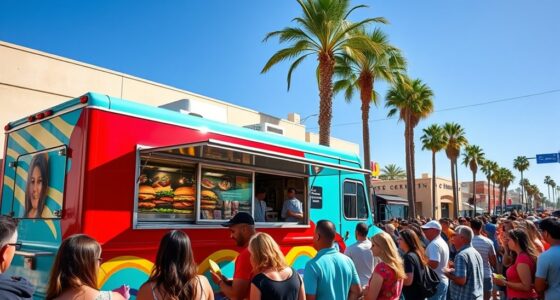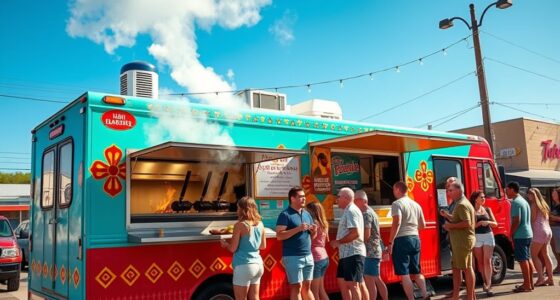To start a food truck in Lexington, KY, you’ll want to create a unique cuisine and build strong branding to stand out locally. Next, check local permits, health inspections, and parking zones to stay compliant. Plan your budget, design an efficient menu, and explore nearby funding options. Focus on community engagement and forming local partnerships to grow your presence. Continue exploring for detailed steps to launch and succeed in Lexington’s vibrant food scene.
Key Takeaways
- Choose a unique cuisine and develop strong branding to stand out in Lexington’s competitive food truck market.
- Complete online permit applications, schedule health inspections, and verify parking zones to ensure legal compliance.
- Secure local funding, grants, and appropriate insurance to support startup costs and protect your business.
- Design a menu featuring local ingredients, and adopt contactless payment and inventory management technology for efficiency.
- Engage with Lexington’s community through festivals, social media promotion, and partnerships to build a loyal customer base.
Starting With a Unique Cuisine
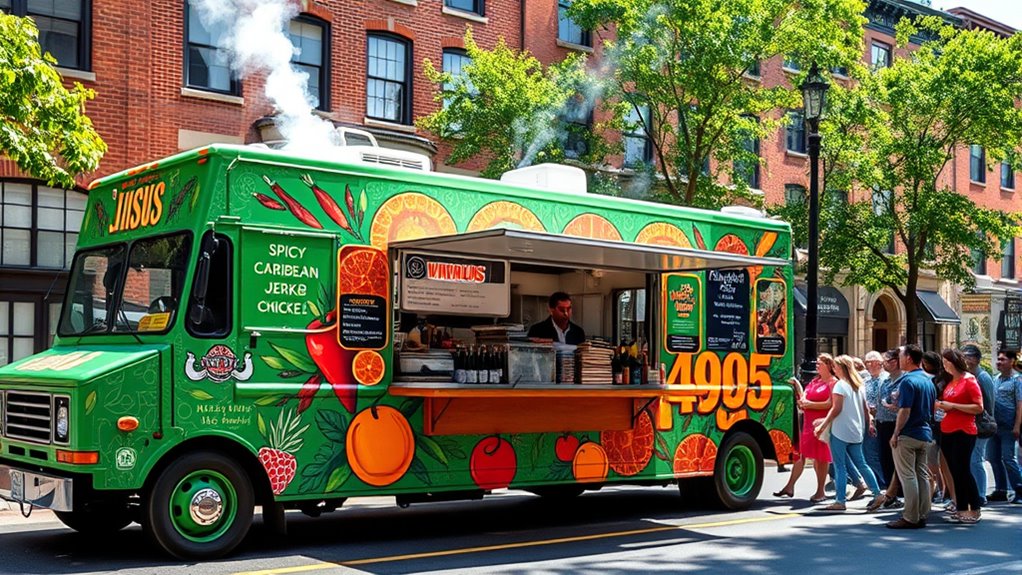
Choosing a unique cuisine for your food truck can set you apart in the competitive Lexington market. When you select a distinct culinary niche, it becomes easier to develop strong food truck branding that resonates with your target audience. Think about what flavors or dishes aren’t widely available nearby—this will help you stand out. Once you’ve identified your specialty, leverage social media marketing to showcase your unique offerings. Share vibrant photos, behind-the-scenes content, and customer reviews to build excitement and loyalty. Consistent branding across your online platforms will reinforce what makes your food truck special. By starting with a standout cuisine and actively promoting it, you’ll attract curious customers enthusiastic to try something new, giving your business a strong foundation for growth. Resources and Tools can also provide valuable insights into trending cuisines and customer preferences to help refine your menu.
Understanding Local Requirements
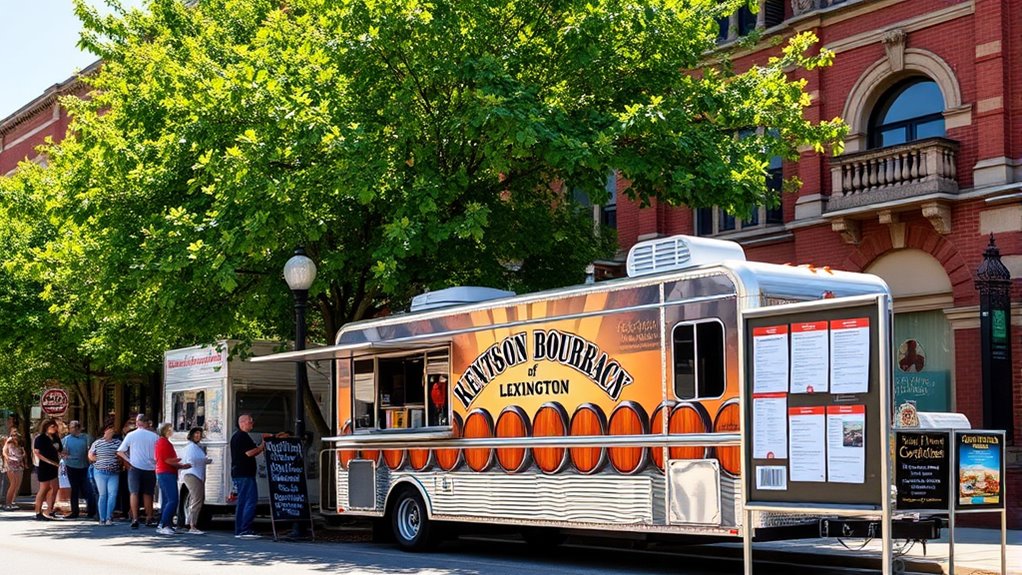
To get started, you’ll need to complete the online permit application and be aware of the scheduled inspection timelines to keep your plans on track. It’s also essential to familiarize yourself with designated street parking zones to ensure your truck is compliant. Understanding these local requirements will help you avoid delays and set a strong foundation for your food truck business. Cultivating a bias to action can also help you navigate potential obstacles more efficiently.
Online Permit Application Process
Are you aware of the specific online permit application process required to start your food truck in Lexington, KY? Navigating the online permit process can seem daunting, but understanding it will help you move forward confidently. Here’s what you need to know:
- Secure your online permit by submitting all necessary documents through the city’s application portal, avoiding delays.
- Complete the application process thoroughly to ensure your permit isn’t rejected due to missing info.
- Stay organized and respond promptly to any follow-up requests from the city to keep your plans on track.
Scheduled Inspection Timelines
Understanding the scheduled inspection timelines is essential to keep your food truck project on track. You’ll need to plan ahead for inspection scheduling, ensuring each step occurs within the required timeframe. Lexington’s local health department sets specific compliance deadlines for food safety inspections, so you must stay aware of these dates. Missing an inspection or delay can result in fines or project delays. Typically, you’ll submit your permit application first, then schedule your initial health inspection. After passing, follow any additional inspections or permits required. Staying organized with a detailed timeline helps you meet all compliance deadlines smoothly. Regularly check with local authorities for updates on inspection schedules, so your food truck launch remains on schedule without unnecessary setbacks.
Designated Street Parking Zones
Knowing where you can legally park your food truck is essential for compliance and smooth operations. Lexington’s designated street parking zones are marked clearly with zone signage, so pay close attention to these signs to avoid parking violations. Parking enforcement actively monitors these zones, and unauthorized parking can lead to fines or towing. To stay compliant, consider these key points:
- Always verify zone signage before parking to ensure you’re in an approved area.
- Respect any time restrictions posted on the signage to avoid penalties.
- Be aware that parking in unapproved zones can disrupt your business and create legal issues.
Understanding and adhering to these local parking requirements ensures smooth operations and helps you build a strong reputation in Lexington.
Setting Up Your Base of Operations

To set up your base of operations, you’ll need to contemplate shared kitchen licensing requirements in Lexington and choose the right custom kitchen equipment. Ensuring your space meets local health codes is essential for smooth operation. Focus on selecting equipment that fits your menu and workflow to keep everything running efficiently. Additionally, considering modern fixtures like a reliable shower can enhance sanitation and maintenance routines in your food truck.
Shared Kitchen Licensing Requirements
Are you aware of the licensing requirements for setting up a shared kitchen in Lexington, KY? Navigating the shared kitchen licensing process can feel overwhelming, but knowing the key steps helps. First, verify your facility meets all health department regulations, which are essential for safety and compliance. Second, obtain the necessary permits, including shared kitchen licensing, to operate legally. Third, prepare for inspections that verify your compliance with sanitation and safety standards. Recognizing the importance of these requirements can give you confidence and peace of mind as you establish your food truck business. Meeting all health department regulations isn’t just a legal obligation—it’s a commitment to your customers’ safety and your reputation. Stay diligent, and you’ll be ready to serve delicious food confidently.
Custom Kitchen Equipment Selection
Choosing the right custom kitchen equipment is vital for creating an efficient and functional food truck setup. Your equipment selection impacts workflow, food quality, and safety, so it’s imperative to choose wisely. Start by evaluating your menu to determine the types of appliances you’ll need, such as grills, fryers, or refrigeration units. Prioritize durable, space-saving designs that fit your truck’s layout. Invest in high-quality, commercial-grade equipment to guarantee longevity and consistent performance. Don’t forget to take into account energy efficiency and ease of cleaning. Custom kitchen equipment tailored to your specific needs will streamline operations and enhance productivity. Carefully selecting your equipment now saves you time and money later, setting a strong foundation for your food truck’s success in Lexington.
Budgeting and Financing Your Food Truck

To start, you need to understand both your initial investment and ongoing monthly expenses to keep your food truck running smoothly. Exploring local small business grants can help ease some financial burdens, while securing liability coverage protects you from potential risks. Knowing these financial aspects guarantees you’re prepared to build a successful food truck business in Lexington. Additionally, researching cost-effective marketing strategies can help attract more customers without overstretching your budget.
Initial Investment vs. Monthly Expenses
Understanding the difference between your initial investment and ongoing monthly expenses is essential for successfully starting a food truck in Lexington, KY. Your initial investment covers equipment, licenses, and setup costs, while monthly expenses include food supplies, fuel, maintenance, and staff wages. Managing these costs effectively impacts your profit margins and revenue streams.
Consider these critical points:
- Your initial investment sets the foundation, but savvy management of monthly expenses keeps your business sustainable.
- Controlling expenses maximizes profit margins, ensuring your food truck remains profitable amid fluctuating costs.
- Regularly reviewing expenses helps you adapt and grow, turning revenue streams into long-term success.
Staying vigilant about both investments and expenses helps you build a resilient food truck business in Lexington.
Local Small Business Grants
Are local small business grants a viable way to finance your food truck in Lexington, KY? These grants offer a great opportunity to access food truck startup funding without taking on debt or giving up equity. Local small business grants are typically awarded to support entrepreneurs and boost the community economy. To qualify, you’ll need a solid business plan and proof of your commitment to the local market. While grants don’t cover all expenses, they can substantially reduce your initial costs and improve your cash flow. Keep an eye on city, county, and regional programs that specifically support small businesses or food-related ventures. Applying for these grants requires effort and persistence, but they can be a pivotal part of your overall financing strategy.
Liability Coverage for Food Trucks
Securing liability coverage is a essential step in budgeting and financing your food truck, as it protects your business from costly claims and legal issues. Without proper insurance requirements, a single accident could jeopardize your entire venture. Ensuring you have adequate liability coverage gives you peace of mind and safeguards your future.
Consider these critical points:
- Protect yourself from potential lawsuits that could drain your finances.
- Meet local regulations and insurance requirements for operating a food truck.
- Gain credibility with customers and vendors, showing you’re a responsible business owner.
Designing Your Menu and Pricing Strategy
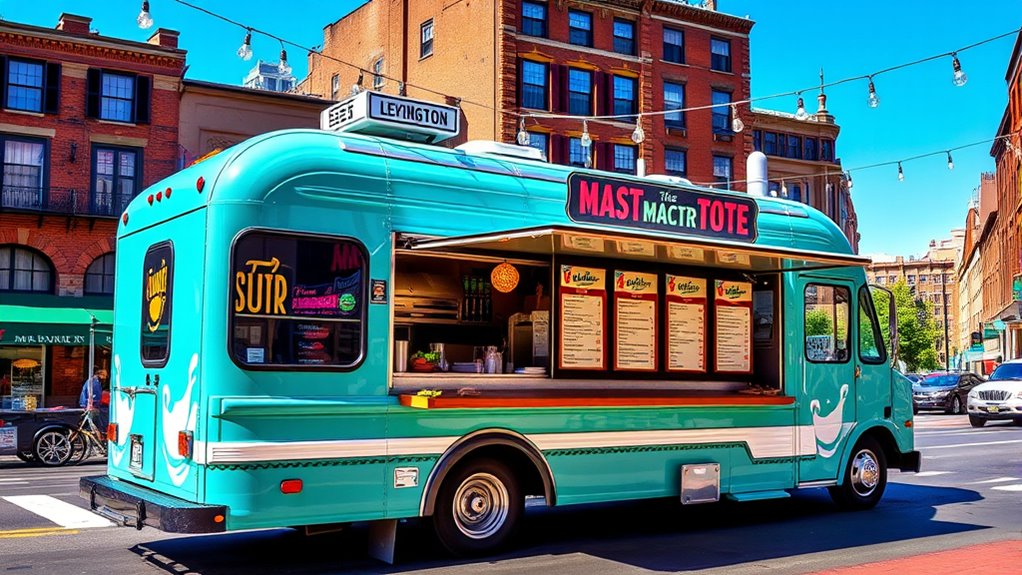
When designing your menu, consider using locally sourced ingredients to appeal to the community and guarantee freshness. You’ll also want to calculate the cost per serving carefully to set competitive prices that cover expenses and maximize profit. Balancing quality with affordability helps attract customers and keeps your food truck thriving. Incorporating seasonal ingredients can also help reduce costs and keep your menu exciting, especially when considering drivetrain components that require proper maintenance to ensure consistent performance.
Locally Sourced Ingredient Integration
Incorporating locally sourced ingredients into your menu not only supports the community but also appeals to customers seeking fresh, authentic flavors. Building strong sourcing partnerships ensures ingredient freshness, giving your dishes a vibrant, genuine taste. To succeed, focus on these key steps:
- Cultivate relationships with local farmers and producers to guarantee quality and consistency.
- Highlight the use of fresh, seasonal ingredients in your menu descriptions to attract discerning customers.
- Adjust your pricing strategy to reflect the quality and uniqueness of locally sourced items, creating a sense of value and authenticity.
Cost per Serving Calculations
Accurately calculating your cost per serving is fundamental to designing a menu that balances quality with profitability. Start with a detailed cost analysis, including ingredients, packaging, and labor for each dish. This helps you determine your true costs and avoid underpricing. Once you know your costs, you can develop effective pricing strategies that ensure a profit while remaining competitive. Consider factors like local market rates, customer willingness to pay, and your desired profit margin. Remember, consistent cost analysis allows you to guarantee a profit as expenses fluctuate or new ingredients are introduced. Balancing these elements ensures your menu remains sustainable and profitable, helping you make smart decisions about portion sizes and pricing to maximize your food truck’s success in Lexington, KY.
Technology and Operations
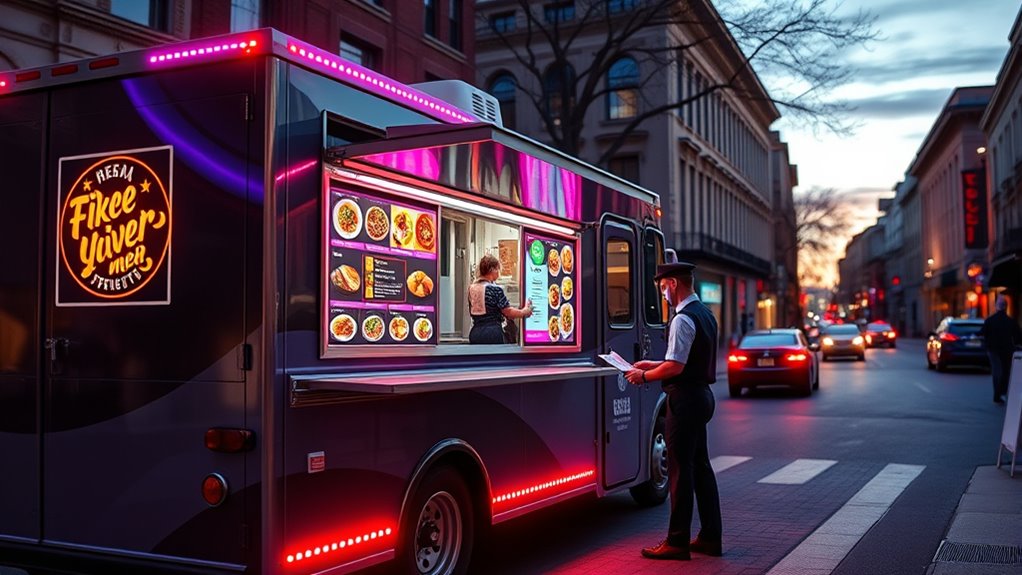
Implementing contactless payment options makes transactions faster and safer for your customers. Using a mobile app to track your inventory helps you stay organized and reduces waste. Embracing these technologies can streamline your operations and improve overall efficiency.
Contactless Payment Options Available
Adopting contactless payment options can streamline your food truck operations and enhance customer experience. With contactless payments, transactions become faster and more secure, making every digital transaction seamless. Customers appreciate the convenience of paying with their smartphones or contactless cards, reducing wait times and increasing satisfaction. By embracing this technology, you’ll see benefits like:
- Faster service—more orders filled, happier customers
- Increased trust—secure, touch-free payments reduce concerns
- Higher sales—encourages spontaneous purchases and tips
Implementing digital transaction options helps you stay competitive and modern. Customers are more likely to return when they can pay effortlessly, creating a positive impression that keeps your food truck thriving in Lexington, KY.
Mobile App for Stock Tracking
Have you considered how a mobile app for stock tracking can streamline your food truck’s operations? With an effective inventory management system, you can keep real-time tabs on your ingredients, reducing waste and preventing shortages. These apps automatically update stock levels as you sell, helping you plan better for busy days. Plus, sales analytics from the app give you insights into popular items and peak hours, enabling smarter menu adjustments and staffing decisions. Using a mobile app simplifies tracking across multiple locations or shifts, saving you time and reducing errors. By integrating inventory management and sales analytics into your daily operations, you can optimize stock levels, improve efficiency, and boost profits—all from your smartphone or tablet.
Marketing and Growing Your Presence
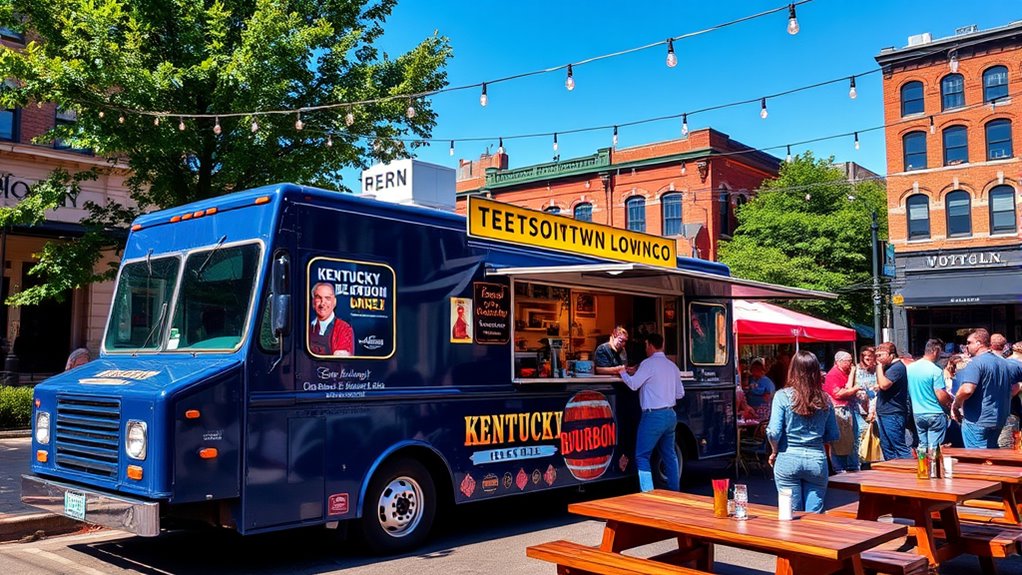
To boost your visibility in Lexington, you should plan a weekly event calendar filled with local gatherings and food festivals. These events give you a chance to connect with new customers and showcase your menu. By actively participating, you’ll grow your presence and build a loyal following.
Weekly Event Calendar Planning
Creating a weekly event calendar is essential for consistently marketing your food truck and building your presence in Lexington. A well-planned schedule keeps your brand top of mind and encourages repeat visits. To maximize impact, consider these strategies:
- Use social media to promote upcoming events, creating anticipation and excitement.
- Schedule special themed days or discounts to boost customer loyalty and engagement.
- Regularly update your calendar to reflect seasonal events and community happenings, making customers feel connected.
Engaging Local Food Festivals
Participating in local food festivals offers a powerful way to boost your food truck’s visibility and attract new customers in Lexington. These events give you a unique platform to showcase your food truck branding to a wider audience. To maximize your impact, promote your festival appearances through social media promotion before, during, and after the event. Share vibrant photos, engaging stories, and updates to build excitement and connect with potential customers. Engaging actively online helps reinforce your brand and encourages festival-goers to seek out your truck. Remember, consistency in your messaging and visuals across all channels strengthens your presence. By strategically engaging with local festivals and leveraging social media, you’ll grow your customer base and establish a strong foothold in the Lexington food scene.
Master Local Food Scene
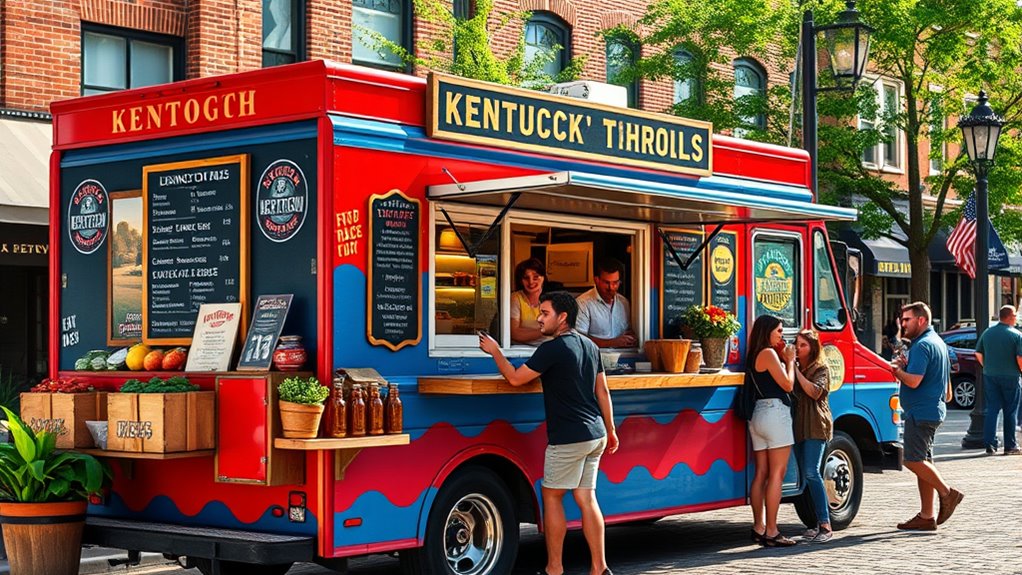
Understanding Lexington’s vibrant food scene is essential for launching a successful food truck. To stand out, focus on creating strong food truck branding that resonates with locals. Engaging with the community helps build customer loyalty, ensuring repeat visits and positive word-of-mouth. Here are three ways to master the local food scene:
Master Lexington’s food scene through authentic branding, community engagement, and local collaborations for lasting success.
- Taste-test local favorites to inspire your menu, showing you respect Lexington’s culinary roots.
- Partner with local farms and suppliers to emphasize freshness and authenticity.
- Attend food festivals and events to showcase your unique offerings and connect with customers face-to-face.
Frequently Asked Questions
What Permits Are Required Specifically for Mobile Food Vendors in Lexington?
You need a mobile vending permit from the Lexington-Fayette Urban County Government to operate legally. Additionally, you must comply with parking regulations, ensuring you don’t block access or violate zoning rules. Obtain a health permit from the local health department, and if you plan to sell food at events, secure event-specific permits. Make sure to follow all local laws for parking and mobile vending to avoid fines or shutdowns.
How Can I Find the Best Locations for My Food Truck in Lexington?
To find the best locations for your food truck in Lexington, KY, explore popular spots like busy streets, parks, and near office buildings. Attend local pop-up markets and participate in event partnerships to gain visibility. Connect with event organizers and local businesses to secure prime spots. Additionally, observe foot traffic patterns and visit different areas during peak hours to identify where your food truck will attract the most customers.
Are There Any Local Food Safety Regulations Unique to Lexington?
In Lexington, KY, you need to follow local health inspections and adhere to food handling standards set by the Lexington-Fayette County Health Department. They enforce regulations specific to mobile food vendors, including proper sanitation, safe food storage, and accurate labeling. Make sure to stay updated on any local ordinances or changes, as these can vary from state-wide rules. Regular inspections ensure you meet all safety standards and keep your food truck compliant.
What Are Common Challenges Faced by Food Truck Owners in Lexington?
You’ll face challenges like maintaining your truck’s maintenance to keep it running smoothly and consistently attracting customers through engagement. Managing daily prep, steering through local regulations, and standing out in a competitive market require effort. You’ll need to stay on top of truck upkeep to avoid breakdowns and actively interact with your community to build loyalty. Balancing these aspects ensures your food truck thrives in Lexington’s vibrant food scene.
How Do I Connect With the Lexington Food Truck Community?
Think of connecting with the Lexington food truck community as planting seeds in a vibrant garden. You can grow relationships through social media networking, engaging with local groups and pages, and sharing your journey. Attend community events, festivals, and farmers’ markets to meet fellow owners and enthusiasts face-to-face. These connections will help you thrive, sharing tips, opportunities, and support, creating a flourishing network that elevates your food truck adventure.
Conclusion
Starting your food truck in Lexington is like planting a seed—you need the right care, passion, and persistence. With a clear plan and understanding of local tastes, your unique cuisine can flourish amid Kentucky’s vibrant food scene. Just ask the owner who turned a small truck into a local legend, proving that with dedication, your food truck can become the heartbeat of Lexington’s culinary landscape. Dig in, and watch your dream grow!
